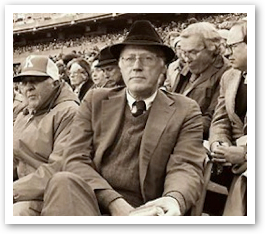Bowie Kent Kuhn
- REV. GEORGE RUTLER
As baseball fans religiously record statistics, Bowie Kent Kuhn (19262007) was, at 42, the youngest commissioner of baseball ever; the tallest, at six-foot-five; and the heaviest, at 250 pounds, though his height made him seem slim.
 |
Bowie Kent Kuhn
|
As I measured up to none of that, I was not an impressive guide when I led him and his wife, Luisa, through the woods of Colorado while on retreat. As snow began to fall, I imagined our becoming a sequel to the Donner party. Bowie appeared in many outdoor situations, including pro-life marches, but most famously was he in the bleachers adjudicating some of the rifest controversies in baseball history, overseeing the renaissance of the national pastime through the use of television for night games, and the expansion of the major leagues to 26 teams.
I do not think he ever wavered from an uncomplicated faith, and often he would ask me to hear his confession with the stolid practicality of a player donning his uniform for a double-header. In our various trips with Legatus, the organization of Catholic business leaders, he scheduled the sacraments and prayer times as though he were making calls from the dugout. Baseball was like an organic appendage, and he chose his first law firm of Willkie, Farr & Gallagher because it represented the National League. Some thought him morally arch, as when he panned Jim Boutons book Ball Four as detrimental to baseball. In 1985 Peter Ueberroth reinstated Willie Mays and Mickey Mantle to play after Bowie had banned them for promoting gambling casinos. At dinner in the far reaches of Long Island on August 14, 1995, the day after Mantle died, Bowie listed for me the reasons he could not in conscience attend the funeral. I thought it a fine parade of righteous indignation in contradistinction to the self-righteousness above which he stood aloof as philosophically as physically. My Church taught me the importance of right and wrong. . . . The Church is my bulwark.
Bowie listed for me the reasons he could not in conscience attend the funeral. I thought it a fine parade of righteous indignation in contradistinction to the self-righteousness above which he stood aloof as philosophically as physically. My Church taught me the importance of right and wrong. . . . The Church is my bulwark. |
When Billy Martin, who accused Bowie of violating basic rights of players, was given a gargantuan funeral after a car crash in bibulous circumstances, and eulogized from the pulpit as sliding into the heavenly home plate safe, Bowie had no comment, but wrote in his memoir, Hardball, that Martin had a wryness that one would find in an abused animal that precluded trust or affection. Suspending George Steinbrenner for making illegal campaign contributions, and the same for Tigers pitcher Denny McLain for illegal bookmaking, were other testaments of Bowies discomfort with moral ambiguity. The man who had been elected commissioner unanimously in 1969 on the first ballot was eased out not all that easily by a coalition of managers after the 1984 season.
Skills with which he promoted groups like the Catholic Values Investment Trust and a committee to defend the representation of the Holy See at the United Nations failed to rescue an ill-advised law partnership. It was another instance of his incongruity with others who preferred the shallows to the higher ground of ethics, and because of bankruptcy laws he moved from New Jersey to Florida, where an offended dignity continued to nurse AIDS patients and pursue philanthropy undeterred.
In Texas he told a convention how I had coded a combination lock in my rectory to match the date of the death of Pope St. Symmachus. For some reason he found my mnemonic device amusing, as did some 600 cowboys who, from that moment, were theoretically able to break into my dining room. A few days before his death, preparing for elective coronary surgery, he indicated to me on the telephone that Extreme Unction is a better strategy than stealing home.
 This is Meaghen Gonzalez, Editor of CERC. I hope you appreciated this piece. We curate these articles especially for believers like you.
This is Meaghen Gonzalez, Editor of CERC. I hope you appreciated this piece. We curate these articles especially for believers like you.
Please show your appreciation by making a $3 donation. CERC is entirely reader supported.

Acknowledgement
Rev. George W. Rutler. "Bowie Kent Kuhn." Crisis (July/August 2007).
This article is reprinted with permission from the Morley Institute a non-profit education organization.
This article appeared first as one of the "Cloud of Witnesses" columns Father Rutler wrote for Crisis. It is included in his book, Cloud of Witnesses - Dead People I Knew When They Were Alive.
The Author
 Father George W. Rutler is the pastor of St. Michael's church in New York City. He has written many books, including: The Wit and Wisdom of Father George Rutler, The Stories of Hymns, Hints of Heaven: The Parables of Christ and What They Mean for You, Principalities and Powers: Spiritual Combat 1942-1943, Cloud of Witnesses — Dead People I Knew When They Were Alive, Coincidentally: Unserious Reflections on Trivial Connections, A Crisis of Saints: Essays on People and Principles, Brightest and Best, and Adam Danced: The Cross and the Seven Deadly Sins.
Father George W. Rutler is the pastor of St. Michael's church in New York City. He has written many books, including: The Wit and Wisdom of Father George Rutler, The Stories of Hymns, Hints of Heaven: The Parables of Christ and What They Mean for You, Principalities and Powers: Spiritual Combat 1942-1943, Cloud of Witnesses — Dead People I Knew When They Were Alive, Coincidentally: Unserious Reflections on Trivial Connections, A Crisis of Saints: Essays on People and Principles, Brightest and Best, and Adam Danced: The Cross and the Seven Deadly Sins.




